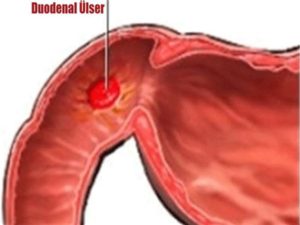Gastric and duodenal ulcers are peptic ulcers, which are open sores in the lining of the digestive tract. Gastric ulcers form in the lining of the stomach. Duodenal ulcers develop in the lining of the duodenum, which is the upper part of the small intestine.
Symptoms
• If you have a duodenal ulcer, you might:
• have pain in the stomach or abdomen (this might come and go)
• have indigestion
• feel very full and bloated after eating
• feel sick
• lose weight

Causes of Duodenal Ulcers
Your stomach makes a strong acid that kills germs and helps you digest food. To protect themselves against this acid, cells of the stomach and duodenum make a barrier from mucus. If this barrier is damaged, an ulcer can form.
The main cause of this damage is infection with bacteria called Helicobacter pylori, or H. pylori. The bacteria can cause the lining of your duodenum to become inflamed and an ulcer can form.
Some medications can also cause a duodenal ulcer, particularly anti-inflammatory drugs such as ibuprofen and aspirin. Rarely, other medicines or medical conditions might cause an ulcer.
It’s possible that you are more likely to get a duodenal ulcer if you smoke, drink a lot of alcohol or you are stressed, but these things are less important than infection with H. pylori.
Diagnosis of a duodenal ulcer
To diagnose a duodenal ulcer, your doctor will talk to you and examine you. They will probably also run some tests, which could include:
• a gastroscopy, where a specialist uses a thin, flexible tube with a camera on the end to look inside your stomach and duodenum
a blood test, stool sample, or breath test to find out if you have a H. pylori in your system.
Treatment for a duodenal ulcer
If your ulcer is caused by H pylori, the usual treatment is ‘triple therapy’. You would need to take 2 antibiotics to kill the bacteria, and a medicine to reduce the amount of acid made by your stomach.
If you don’t have an H. pylori infection, and you have been using anti-inflammatory drugs, you will need to stop taking them (if possible) and to start taking a drug to reduce acid production by your stomach.
Taking antacids, drinking less alcohol, and quitting smoking if you smoke may also help.